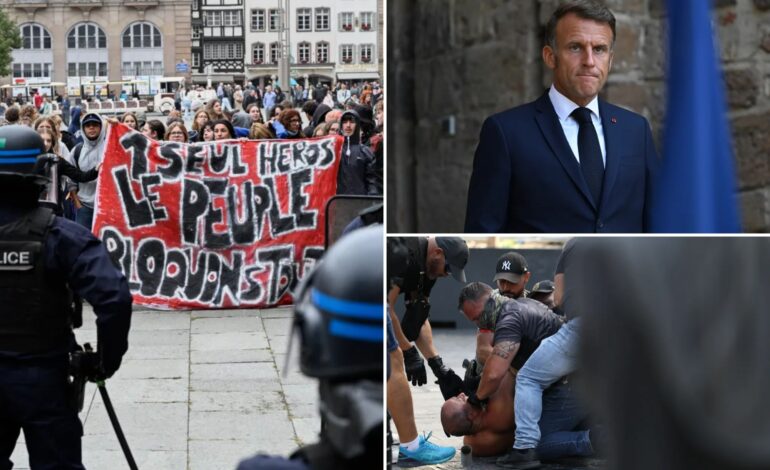Protests Erupt Across France as Macron Appoints New Prime Minister

Protests erupted throughout France on Wednesday, resulting in the arrest of approximately 250 demonstrators as citizens expressed their anger over President Emmanuel Macron‘s government and its budget cuts. The unrest coincided with the first day of new Prime Minister Sébastien Lecornu, marking a turbulent start for his tenure. The government’s interior ministry reported that the protests were part of a planned movement aimed at blocking key infrastructure across the country.
Demonstrators engaged in a variety of disruptive activities, including blocking roads and setting fires. In the city of Rennes, a bus was set ablaze, while elsewhere, damage to electrical cables caused significant interruptions to train services, according to government transport authorities. Despite a significant police presence of 80,000 officers, the protests showcased a continued discontent that has characterized Macron’s presidency.
The demonstrations were less intense than previous waves of unrest, such as the Yellow Vest protests of 2018-2019, which were marked by widespread civil disobedience against economic inequality. Recent years have seen Macron face backlash over unpopular pension reforms and social unrest following the police shooting of a teenager in Paris. The protests on Wednesday reflected a renewed sense of crisis, particularly after the government faced a parliamentary confidence vote that led to the resignation of former Prime Minister François Bayrou.
As Lecornu assumed office, he was immediately confronted with the challenges posed by the protest movement. Groups attempted to block Paris’s beltway during the busy morning commute but were met with police intervention and tear gas. Throughout the morning, police reported 159 arrests in Paris alone, along with additional arrests in other cities, totaling around 100 across France.
The protests were widespread, with demonstrations occurring from the southern port city of Marseille to Lille in the north, and from Nantes and Rennes in the west to Grenoble and Lyon in the southeast. This national mobilization highlighted the growing frustration with the current government and its policies.
Many protesters voiced their grievances over the potential privatization of public services and the increasing cost of living. Aglawen Vega, a nurse and union delegate, emphasized the struggles of ordinary citizens, stating, “We’re governed by robbers. People are suffering, finding it harder to last the month.” Vega warned that the current unrest could evolve into a broader social movement, reflecting sentiments similar to those that sparked the Yellow Vest protests.
Not all citizens supported the disruptions. Bertrand Rivard, an accounting worker, expressed frustration with the protests, stating, “We live in a democracy, and the people should not block the country because the government doesn’t take the right decisions.”
The “Block Everything” movement gained traction over the summer through social media and encrypted messaging platforms. It called for a day of strikes, boycotts, and demonstrations in response to Bayrou’s proposed budget cuts of €44 billion (approximately $51 billion) aimed at addressing France’s growing deficit. The proposals, which included the elimination of two public holidays, were met with strong opposition from the public.
Lecornu, a former Minister of Defense, is now tasked with navigating these budgetary challenges amid a backdrop of political instability. Macron’s government has faced increasing scrutiny since the dissolution of the National Assembly last year, which resulted in a legislative election that shifted power dynamics in parliament.
Interior Minister Bruno Retailleau suggested that left-wing radicals had co-opted the protest movement, although its support base appears to be diverse. He claimed that some protesters were intent on violence, observing that groups dressed in black exhibited characteristics associated with extreme-left movements. Despite this, calls for non-violence have accompanied the movement’s online activities.
The spontaneous nature of the “Block Everything” movement echoes the origins of the Yellow Vest protests, which initially centered on fuel tax increases. The current unrest reflects a deep-seated dissatisfaction with economic conditions and governance, suggesting that the challenges facing Macron’s administration may persist as France continues to grapple with its political and social landscape.






